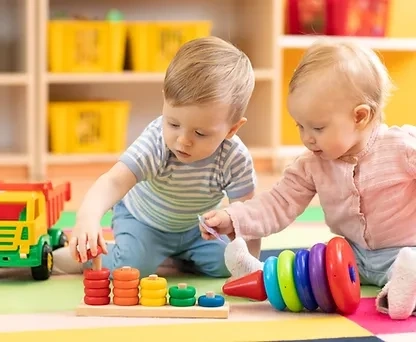Preschool plays a significant role as a starting point in the learning process, as it pays attention and enables children to adapt to kindergarten's academic and social demands. Parents expect their children to be well taken care of and well-taught by preschool teachers, but preschool also prepares the child for the transition from the home environment to an organized school setting.
Social Development
Learning to Interact with PeersA significant part of preschool education is identifying how children relate to their fellow children or how they should relate to them. Preschoolers learn to share, take turns, or share equipment or toys with other children. These relations are foundational for originating the capability to develop fellowships and work effectively with others, which are necessary in a kindergarten classroom.
Developing Communication SkillsPreschoolers are inspired to convey their beliefs, emotions, and opinions through various movements, including storytelling, show-and-tell, and class debates. This wisdom enhances their oral communication aptitudes and lets them learn to listen to others, apprehend diverse viewpoints, and tell their requirements and wishes.
Understanding Social NormsIn preschool, concepts of social norms involve teaching children about acceptable behaviors and the general expectations of everyday life through spacing, time-tabling, and classroom regulation. They gain knowledge of the procedure of following instructions, sharing, and handling limits, which are crucial in preparations for a kind gesture towards the formal learning atmosphere of a more tender kindergarten class.
Emotional Development
Building Self-Regulation SkillsPreschool Fairfax County VA adopts the emotional and behavioral regulation abilities whereby new knowledge is taught to youths to help them cope with challenging emotions. Activities such as waiting, waiting for turns, using playing rules, and the like help improve children's patience and self-control. These skills are essential for children in the early years, with a significant focus on the children in kindergarten since they are supposed to learn to remain on task, follow instructions, and even manage their emotions in a classroom setting.
Enhancing IndependenceIn preschool, children are motivated to accomplish tasks alone, such as dressing, collecting belongings, and making easy decisions. It promotes Independence and trust, which allows them to feel more confident and capable as they enter kindergarten.
Building Emotional ResiliencePreschool equips a secure setting for kids to share and navigate different emotions, including frustration, disappointment, and happiness. Teachers help children comprehend and communicate their emotions, which builds emotional strength and trains them to handle kindergarten's emotional ups and downs.
Cognitive Development
Early Literacy SkillsPreschool familiarizes kids with early literacy talents through storytelling, reading audibly, and identifying letters and sounds. These movements lay the groundwork for reading and writing, which are prominent in the kindergarten curriculum. When kids join kindergarten, they are usually familiar with the alphabet, can remember their names in print, and have basic phonics knowledge.
Early Numeracy SkillsThrough play-based movements, preschool instructs foundational numeracy aptitudes such as calculating, identifying numbers, and comprehending essential mathematical ideas like shapes, designs, and sizes. These skills are required for kindergarten, where kids will use this ability to engage in more complicated mathematical thought.
Problem-solving and Critical ThinkingPreschool Oakton VA promotes problem-solving and requires thinking through exercises that require kids to study, experiment, and discover solutions. Puzzles, formation blocks, and easy science experiments stimulate interest and mental development. These experiences help kids acquire the capability to think critically and approach issues confidently, which is necessary for educational victory in kindergarten.
Physical Development
Fine Motor SkillsPreschool movements such as pictures, cutting with scissors, and using small things assist in developing fine motor skills. These talents are essential for jobs like writing, utilizing classroom tools, and amusing in art assignments in kindergarten. By enhancing hand-eye coordination and agility, preschool ensures that kids are physically prepared for the demands of kindergarten.
Gross Motor SkillsOutdoor sports and physical exercises in prekindergarten contribute to creating gross motor skills. Running, jumping, mounting, and other physical exercises improve coordination, balance, and potency. These skills are necessary for experiencing kindergarten physical education sports and overall physical fitness and well-being.
Health and Hygiene HabitsPreschool conducts children's essential fitness and hygiene practices, such as cleaning hands, wrapping their mouths when coughing, and handling personal cleanliness. These practices are essential for keeping a healthy kindergarten classroom setting and encouraging self-care and Independence.
Building a Love for Learning
Creating a Positive Attitude Towards SchoolPreschool sets the stage for a positive attitude toward learning by making education enjoyable and engaging. Through fun and interactive activities, children develop a love for learning and a curiosity about the world around them. This positive association with school and learning is crucial for a smooth transition to kindergarten and for fostering a lifelong love of learning.
Encouraging Curiosity and ExplorationPreschool encourages children to explore their interests and ask questions. By providing various learning materials and experiences, preschool stimulates curiosity and promotes a sense of wonder. This inquisitive mindset is valuable in kindergarten, where children are expected to explore new concepts and ideas.
Developing Learning RoutinesPreschool introduces children to learning routines like circle time, storytime, and structured play. These routines help children understand the rhythm of a school day and prepare them for the structured kindergarten environment. By familiarizing children with these routines, preschool helps reduce anxiety and builds a sense of security and predictability.
Fostering Inclusive and Adaptive Learning
Catering to Diverse Learning StylesPreschools often employ various teaching methods to cater to different learning styles. Whether through visual aids, hands-on activities, or auditory instruction, preschool teachers adapt their methods to meet the needs of each child. This inclusive approach ensures that all children are engaged and supported, preparing them for the diverse learning methods they will encounter in kindergarten.
Addressing Special Needs EarlyPreschool Burke VA provides an opportunity to identify and address developmental delays or special needs early on. With the help of specialized educators and interventions, children with special needs receive the support they need to thrive. Early identification and support ensure that these children are better prepared for the challenges of kindergarten and beyond.
Promoting Cultural Awareness and DiversityPreschool classrooms often reflect a diverse community of learners. Kids learn about different cultures, traditions, and perspectives through activities and discussions. This exposure fosters cultural awareness and acceptance, which is necessary for creating an inclusive and respectful classroom environment in kindergarten.



